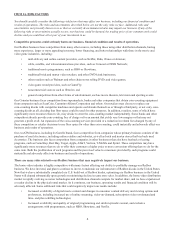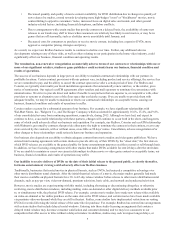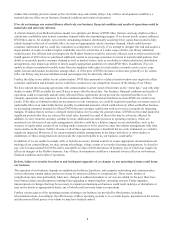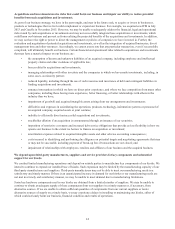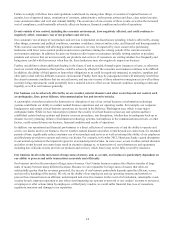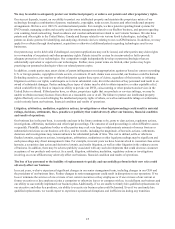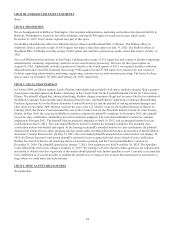Redbox 2015 Annual Report Download - page 16
Download and view the complete annual report
Please find page 16 of the 2015 Redbox annual report below. You can navigate through the pages in the report by either clicking on the pages listed below, or by using the keyword search tool below to find specific information within the annual report.studios that currently provide content on the street date may seek similar delays. Any of these developments could have a
material adverse effect on our business, financial condition and results of operations.
If we do not manage our content library effectively, our business, financial condition and results of operations could be
materially and adversely affected.
A critical element of our Redbox business model is to optimize our library of DVD titles, formats, and copy depth to achieve
satisfactory availability rates to meet consumer demand while also maximizing margins. If we do not timely acquire sufficient
DVD titles, due to, for example, not correctly anticipating demand, intentionally acquiring fewer copies than needed to fully
satisfy demand or the lack of available titles, we may not appropriately satisfy consumer demand, which could decrease
consumer satisfaction and we could lose consumers to competitors. Conversely, if we attempt to mitigate this risk and acquire a
larger number of copies to achieve higher availability rates for select titles or a wider range of titles, our library utilization
would become less efficient and our margins for the Redbox business would be adversely affected, such as what occurred in the
fourth quarter of 2015 when we purchased additional content to encourage consumers to return to normal rental patterns. Our
ability to accurately predict consumer demand as well as market factors, such as our ability to obtain satisfactory distribution
arrangements, may impact our ability to timely acquire appropriate quantities of certain DVD titles. In addition, if we are
unable to obtain or maintain favorable terms from our suppliers with respect to such matters as timely movie access, copy
depth, formats and product destruction, among others, or if the price of DVDs increases or decreases generally or for certain
titles, our library may become unbalanced and our margins may be adversely affected.
Further, the delay in our ability to rent certain studios’ DVD titles pursuant to a delayed rental window may negatively affect
consumer satisfaction and demand, and we could lose consumers to our competitors because of the timing of our library.
We have entered into licensing agreements with certain studios to allow rental of their titles on the “street date,” and with other
studios to make DVDs available for rent 28 days or more after the street date. Our business, financial condition and results of
operations could be materially and adversely affected if these agreements do not provide the expected benefits to us. For
example, agreements may require us to license minimum quantities of theatrical and direct-to-video DVDs for rental at our
kiosks. If the titles or format provided are not attractive to our consumers, we could be required to purchase too many copies of
undesirable titles or an undesirable format, possibly in substantial amounts, which could adversely affect our Redbox business
by decreasing consumer demand for offered DVD titles and consumer satisfaction with our services or negatively impacting
margins. If studios that do not have a delayed rental window elect to delay the general release of DVDs to the rental market for
significant periods after they are released for retail sales, demand for rental of these titles may be adversely affected. In
addition, we have incurred, and may continue to incur, additional non-cash increases to operating expenses, which are
amortized over the terms of any such arrangements, that also could have a dilutive impact on our stockholders, such as the
issuance of equity under certain of our existing studio contracts or to the extent we enter into similar arrangements with other
movie studios in the future. Further, if some or all of these agreements prove beneficial but are early terminated, we could be
negatively impacted. Moreover, if we cannot maintain similar arrangements in the future with these or other studios or
distributors, or these arrangements do not provide the expected benefits to us, our business could suffer.
In addition, if we are unable to comply with, or lack the necessary internal controls to ensure appropriate documentation and
tracking of our content library, we may, among other things, violate certain of our studio licensing arrangements, be forced to
pay a fee for unaccounted for DVDs and be susceptible to risks of theft and misuse of property, any of which may negatively
affect our margins in the Redbox business. Any of these developments could have a material adverse effect on our business,
financial condition and results of operations.
Defects, failures or security breaches in and inadequate upgrades of, or changes to, our operating systems could harm
our business.
The operation of our business depends on sophisticated software, hardware, and computer networking and communication
services that may contain undetected errors or may be subject to failures or complications. These errors, failures or
complications may arise particularly when new, changed or enhanced products or services are added. In the past, there have
been limited delays and disruptions resulting from upgrading or improving these operating systems. Future upgrades,
improvements or changes that may be necessary to expand and maintain our business could result in delays or disruptions or
may not be timely or appropriately made, any of which could seriously harm our operations.
Further, certain aspects of the operating systems relating to our business are provided by third parties, including
telecommunications. Accordingly, the effectiveness of these operating systems is, to a certain degree, dependent on the actions
and decisions of third parties over whom we may have limited control.
8










